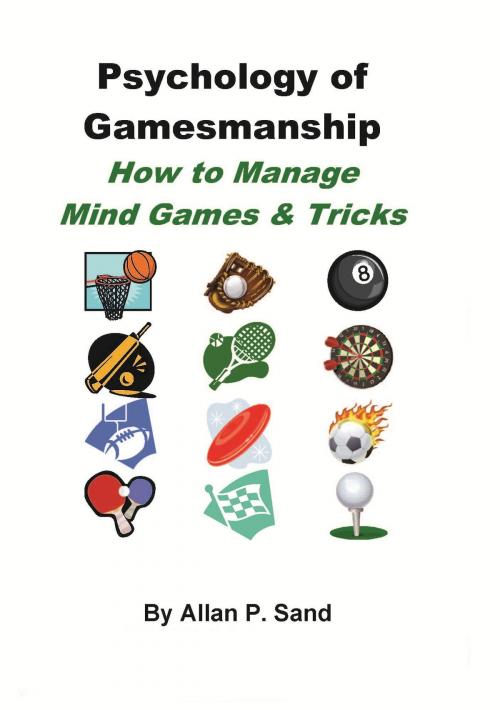Psychology of Gamesmanship: How to Manage Mind Games and Tricks
Nonfiction, Religion & Spirituality, Philosophy, Methodology, Sports, Reference, Sports Psychology| Author: | Allan P. Sand | ISBN: | 9781476259352 |
| Publisher: | Allan P. Sand | Publication: | April 20, 2012 |
| Imprint: | Smashwords Edition | Language: | English |
| Author: | Allan P. Sand |
| ISBN: | 9781476259352 |
| Publisher: | Allan P. Sand |
| Publication: | April 20, 2012 |
| Imprint: | Smashwords Edition |
| Language: | English |
The world of sharking does not apply only to table billiards and pool. Sharking exists in every aspect of your life. You are sharked and you shark others every day. If you look closely at nature, all species use sharking efforts to survive. Everything from camouflage to shock & awe can be observed.
It is important to be aware of situations where psychological tricks and traps can be applied. Being alert helps you minimize and counter their affects. Don't obsess about it, just accept the facts that these attempts are being used by everyone, whether on purpose, or unintentionally.
The concept of bending an opponent's mind ("sharking") has been around a long time. These have been used in nature since the beginnings of the food chain. It is so pervasive in the world that Sun Tzu incorporated it in his "The Art of War", and that was 2,500 years ago. Do you think that there were no psychological sharking tricks and traps going on at the first Olympics? These were the guys who came up with the Trojan Horse - an ultimate shark if ever there was one.
Sharking can be so subtle that you can question whether someone is affecting your way of thinking. If you spend too much time debating about it, you can assume that someone saying "hello" is a shark attempt (and it might be). Paranoia is one of the health risks of seriously studying competitive psychology.
There are opponents who use subterfuges that are crass, low-class, and obvious to the extreme. Many players think that what distracts them must also distract you. If they've been hit with a sledge hammer attack and it distracted them from their game, they in turn blindly believe that to be the "gold standard" of psychological attacks.
On the other hand, some players see the mastery of these efforts merely as a standard competitive skill. They select and apply each maneuver as part of their overall strategic program, carefully tailored to their competition. Each attempt to confuse an opponent is chosen after careful analysis and then applied with precision.
To them, this is not cheating, but the use of a tool applied with the same finesse and style as any defensive or offensive move. They have a very large library of choices and options that can be adapted to their competitor's personality and playing style. Compared to the gross approach, they prefer the gentle tap of a carefully placed psychological chisel.
The world of sharking does not apply only to table billiards and pool. Sharking exists in every aspect of your life. You are sharked and you shark others every day. If you look closely at nature, all species use sharking efforts to survive. Everything from camouflage to shock & awe can be observed.
It is important to be aware of situations where psychological tricks and traps can be applied. Being alert helps you minimize and counter their affects. Don't obsess about it, just accept the facts that these attempts are being used by everyone, whether on purpose, or unintentionally.
The concept of bending an opponent's mind ("sharking") has been around a long time. These have been used in nature since the beginnings of the food chain. It is so pervasive in the world that Sun Tzu incorporated it in his "The Art of War", and that was 2,500 years ago. Do you think that there were no psychological sharking tricks and traps going on at the first Olympics? These were the guys who came up with the Trojan Horse - an ultimate shark if ever there was one.
Sharking can be so subtle that you can question whether someone is affecting your way of thinking. If you spend too much time debating about it, you can assume that someone saying "hello" is a shark attempt (and it might be). Paranoia is one of the health risks of seriously studying competitive psychology.
There are opponents who use subterfuges that are crass, low-class, and obvious to the extreme. Many players think that what distracts them must also distract you. If they've been hit with a sledge hammer attack and it distracted them from their game, they in turn blindly believe that to be the "gold standard" of psychological attacks.
On the other hand, some players see the mastery of these efforts merely as a standard competitive skill. They select and apply each maneuver as part of their overall strategic program, carefully tailored to their competition. Each attempt to confuse an opponent is chosen after careful analysis and then applied with precision.
To them, this is not cheating, but the use of a tool applied with the same finesse and style as any defensive or offensive move. They have a very large library of choices and options that can be adapted to their competitor's personality and playing style. Compared to the gross approach, they prefer the gentle tap of a carefully placed psychological chisel.















